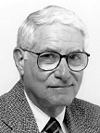| Home | Blog | Ask This | Showcase | Commentary | Comments | About Us | Contributors | Contact Us |

A special Pulitzer for Knight Ridder's pre-war coverage?SHOWCASE | July 201, 2006Gilbert Cranberg says the DC bureau and Landay, Strobel, Walcott deserve high honors for their reports challenging the Bush administration during the build-up to the invasion of Iraq. By Gilbert Cranberg Pulitzer prizes for journalism are awarded in the year after the work is published. Curiously, the letter nominating Knight Ridder's Washington reporting for an award in 2004 began by citing a Sept. 6, 2002, story. That story, by Jonathan S. Landay, was one of a number written in 2002 by Landay, Warren P. Strobel and Bureau Chief John Walcott that challenged and debunked the administration's case for war against Iraq. Those stories arguably were of Pulitzer Prize quality. After all, while much of the press joined in lock-step with the administration's march to war, Knight Ridder (now McClatchy Newspapers) and its three correspondents had the courage to buck the tide and dig out well-grounded misgivings about the build-up to war. Except that Knight Ridder never submitted any of its important '02 coverage for a Pulitzer. As Bureau Chief Walcott recalls it, "I think we may not have submitted the '02 work because its merit wasn't clear until Bush attacked Iraq in March '03 and then the WMD never materialized. In other words, we may have lost out because we were so far ahead of the curve..." A year later, therefore, Knight Ridder used its bid for an '04 Pulitzer to declare, in effect, "We told you so." Nevertheless, Knight Ridder's Washington Bureau's frequent, fearless, ground-breaking, skeptical and authoritative reporting was no secret to hard-to-impress journalists. When Kristina Borjesson gathered material for her 2005 book, "Feet to the Fire: The Media After 9/11," her collection of interviews with distinguished journalists, she reported, "By far and away, the most often mentioned and most highly recommended news source was Knight Ridder." Paul Krugman of the New York Times commented to Borjesson, "...with respect to the war, when all these supposed revelations about everything from aluminum tubes to mobile biological weapons vans came out, I said, 'I knew all that beforehand, why did I know all that? It's because I've been reading Knight Ridder all along, and the guys at Knight Ridder had been reporting on the doubts among the midlevel people in the intelligence community." Here is the gist of that coverage as revealed by the heads on pieces distributed by the bureau in 2002: Additional pieces may be found on a McClatchy Web site under the title, “The decisions, policies and intelligence behind the Iraq War.” There were some 80 probing and revealing war-related pieces between January 2002 and May 2005. In a lecture at Stanford in May 2006, the now-retired Knight Ridder Washington editor, Clark Hoyt, observed of Knight Ridder's reports of bogus and distorted intelligence, "It all seems too tragically obvious today, but believe me this was lonely journalism in 2002 and 2003." How lonely can be judged by the hard time the veteran and respected Walter Pincus of the Washington Post had getting into his paper a major story questioning the administration's case for war. The story ran only after Bob Woodward lobbied Executive Editor Leonard Downie Jr. to publish it, but even then it appeared on Page 17. So against the grain was Knight Ridder's reporting, Hoyt told the Stanford audience, that skeptical editors gave his bureau's material disappointing play and asked, "'The New York Times and Washington Post weren't reporting this stuff. How do we know you're right?'" Even if Knight Ridder had not self-censored a Pulitzer nomination for its pre-war coverage, therefore, it's questionable how it would have been regarded by Pulitzer judges. Recall that this was a time when much of the press uncritically lauded Colin Powell's deeply flawed pro-war presentation to the U.N. Security Council. ("Irrefutable" was the head on the Washington Post's credulous and all-too-typical editorial.) The press, whether consciously or otherwise, reflected public opinion, which then strongly favored a war to oust Saddam. The Pulitzer Prize Advisory Board does not award retroactive Pulitzers. It does, however, issue Special Citations and Special Awards "to a work or an individual of particular merit." Since 1930 it has done so more than 30 times, most recently this year to historian Edmund S. Morgan and, posthumously, to composer Theolonius Monk. A dozen journalists and news organizations have been so honored through the years, among them Walter Lippmann, Gannett newspapers and the Kansas City Star. This country's press did not distinguish itself with its pre-war Iraq coverage. The equivalent of mea culpas run by both the Times and the Post are a measure of how deficient it was. The "lonely journalism" of Knight Ridder and staffers Landay, Strobel and Walcott were outstanding exceptions that merit Pulitzer recognition.
|
|||||||||||



